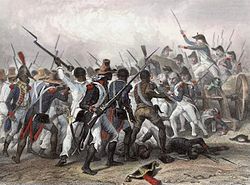Montserrat slave rebellion of 1768
| Montserrat slave rebellion of 1768 | |||
|---|---|---|---|
| Part of slave revolts in North America | |||
 Map of Montserrat (19th century) | |||
| Date | 1768 | ||
| Location | 16°42′N 62°12′W / 16.7°N 62.2°W | ||
| Goals | Liberation | ||
| Resulted in | Rebellion suppressed | ||
| Parties | |||
| |||
| Lead figures | |||
| Outcome | |||
| Death(s) | 9 executed | ||
| Part of a series on |
| North American slave revolts |
|---|
 |
The Montserrat slave rebellion of 1768 was an unsuccessful slave rebellion in the British colony of Montserrat in the Caribbean Sea that took place on 17 March 1768.
Background
[edit]Irish colonists began to settle Montserrat in the 1630s following tensions with English colonists in nearby Saint Kitts[1] and started importing African slaves in 1650 to work on the island's cotton, tobacco, and sugarcane plantations.[2] By the late 1760s, as a result of dwindling provisions, labour shortages, and increasingly strict oversight, slaves faced worsening living conditions.[3]
Uprising
[edit]By 1768, slaves outnumbered white colonists by three to one,[1] and black and creole Montserratians, led by the slave Cudjoe, decided to stage an uprising against the plantation owners.[3] 17 March was chosen as the day of the uprising as the rebels knew that their Irish enslavers would be drinking heavily for St Patrick's Day.[4]
The rebels planned for domestic slaves at Government House to seize any weapons held there[5] while other slaves would arm themselves with rocks, farm tools, clubs and homemade swords,[1] but the plot was disclosed by a female slave to an Irishwoman,[6] leading to a successful quashing of the rebellion.
Repercussions
[edit]Nine rebels, including Cudjoe, were hanged,[4] and his head placed on a silk-cotton tree as a warning to slaves considering another revolt.[5] Thirty other rebels were imprisoned and then sold to other islands.[5]
Cultural legacy
[edit]The uprising was forgotten until 1971 when Montserratian scholars discovered references to the rebellion and began to publicise it. In 1985, the Government of Montserrat declared 17 March a national holiday.[5] St Patrick's Day is now the centrepoint of a ten day festival honouring the rebellion and its members.[4]
In 2018, Montserratian playwright Chadd Cumberbatch wrote and directed a new play, 1768, as a theatrical re-imagining of the uprising to mark the 250th anniversary of the events.[7][8]
References
[edit]- ^ a b c Afrikan77, New (17 March 2018). "The Cudjoe & Montserrat Slave Rebellion March 17 1768 Africans Attack Irish Planters". newafrikan77. Retrieved 23 March 2022.
{{cite web}}: CS1 maint: numeric names: authors list (link) - ^ Lennard, J. (1998) "Grumblings from an Ashen Island", Americas, Vol. 50, Issue 1, p. 44.
- ^ a b Ryzewski & Cherry, p. 356.
- ^ a b c Meade, Natalie (21 March 2019). "St Patrick's Day on Montserrat". The New Yorker. Conde Nast. Retrieved 1 September 2021.
- ^ a b c d Fergus, p. 83.
- ^ Bush, p. 67.
- ^ "1768: A Theatric Reimagining of St. Patrick's Day 250 Years Ago". 20 March 2018.
- ^ "1768 Uprising to be remembered with Drums at Montserrat's St Patrick's Festival".
Sources
[edit]- Bush, B. (1990) Slave Women in Caribbean Society 1650-1838, Heinemann Publishers: Kingston, Jamaica. ISBN 085255 058 8.
- Fergus, H. (1996) Gallery Montserrat: Some Prominent People In Our History, Canoe Press, Montserrat. ISBN 976-8125-25-X.
- Ryzewski, K. & Cherry, J. (2015) "Struggles of a Sugar Society: Surveying Plantation-Era Montserrat, 1650–1850", International Journal of Historical Archeology, 19 (2).

